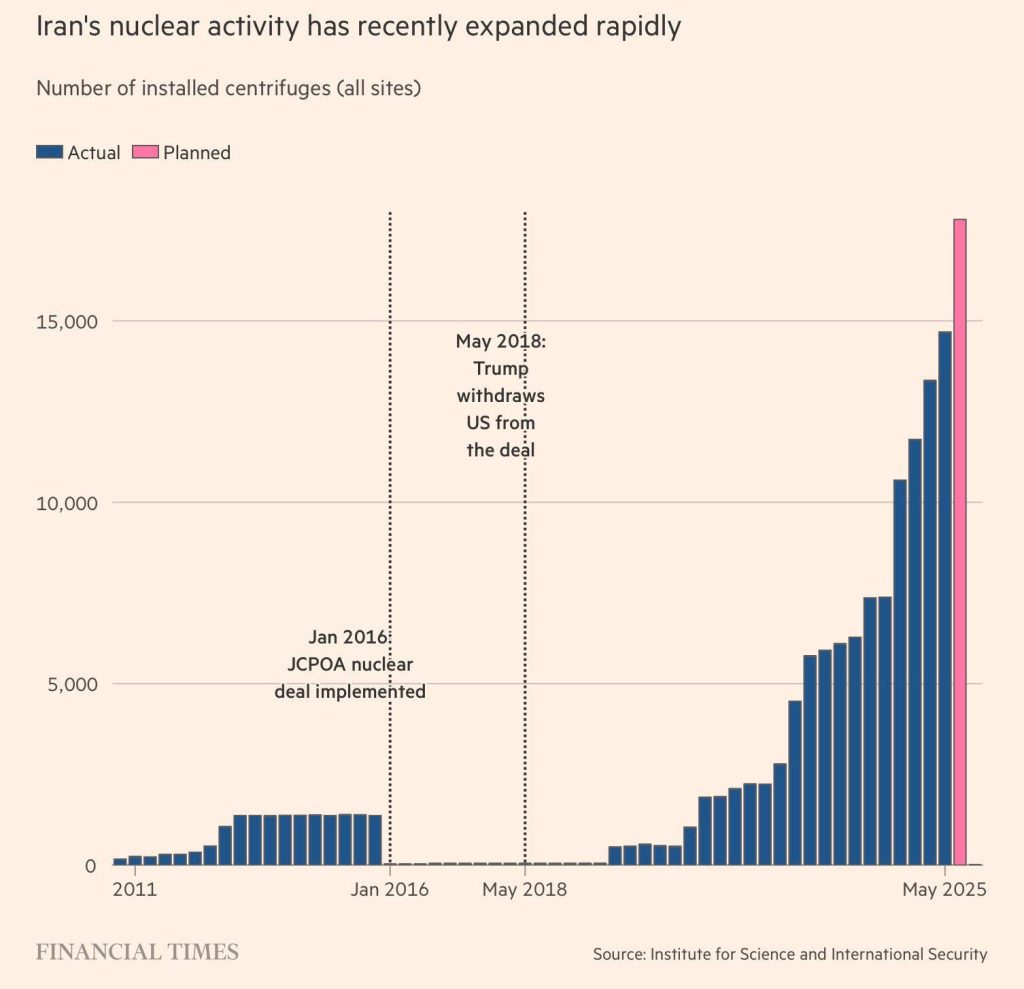Will Trump’s war halt Iran’s nuclear ambitions or lead to disaster? A roundup of smart commentary.
I think the most rational response to President Trump’s bombing of Iran’s nuclear facilities is to hang back a bit — that is, to acknowledge that he’s the wrong leader to do this, that he was more likely acting on ego and personal pique than out of any strategic vision, but that it’s too soon to tell whether this will be a disaster or might actually accomplish some good.
One starting point is that Iran shouldn’t be allowed to possess nuclear weapons. Another starting point is to understand that what led to this really is all Trump’s fault. President Barack Obama painstakingly negotiated an agreement with Iran that significantly slowed Iran’s race to get a nuclear bomb, and Trump undid that in his first term for no discernible reason other than to disrespect Obama.
Mike Stucka, a data journalist with Gannett, posted a chart on Facebook from the Financial Times. It shows that Iran’s nuclear activity virtually stopped during the period that the agreement was in effect and then ramped up again a few months after Trump canceled it. Acceleration continued during Joe Biden’s presidency.

According to news reports, the Trump administration is sending signals that its use of bunker-busting bombs over the weekend was a one-off, that it is not seeking the fall of the Iranian regime, and that it would like negotiations to resume. Good luck with that. Scott Peterson of The Christian Science Monitor reports that U.S. and Israeli aggression are sparking a surge of patriotism in Iran, even among people who ordinarily oppose the theocratic dictatorship that’s in charge of the country. He writes:
If strategists in Washington and Tel Aviv had calculated that airstrikes would put irresistible pressure on the authorities, some Iranian analysts say that nationalist sentiment has risen notably in recent days. That appears due in no small part to Mr. Trump’s hectoring manner and condescending tone, they add, which makes their proud nation even less likely to concede.
“It has a rally-around-the-flag effect,” says Hassan Ahmadian, an assistant professor of Middle East and North Africa studies at Tehran University. “The Iranian psyche is very much disturbed when there is an invasion of the country, or an imposition of the sort that Trump is talking about.”
I generally begin my day by reading Heather Cox Richardson’s newsletter, and her latest edition does an excellent job of rounding up some salient points. She notes, without comment, that Trump’s decision to attack Iran comes a week after he was humiliated by millions of protesters turning out across the country on the same day as his sparsely attended military parade. Other observations Richardson has gleaned from her reading:
- It is too early to tell whether the U.S. truly delivered a devastating blow to Iran’s nuclear ambitions or if, instead, it was merely a temporary setback from which it can quickly recover.
- Iran may have moved uranium and bomb-making material out of the deeply fortified Fordo site in advance of the U.S. attack.
- Although constitutional provisions for declaring war have long since fallen into disuse, Trump may have violated the 1973 War Powers Resolution, which requires consultation with Congress in non-emergency situations — and this clearly was not an emergency.
David Frum of The Atlantic, a neocon Never Trumper who was a cheerleader for the war in Iraq when he was President George W. Bush’s speechwriter, is predictably enthusiastic that Trump has taken action against Iran. Nevertheless he urges caution in an essay headlined “Right Move, Wrong Team” (gift link):
Trump did the right thing, but he did that right thing in the wrongest possible way: without Congress, without competent leadership in place to defend the United States against terrorism, and while waging a culture war at home against half the nation. Trump has not put U.S. boots on the ground to fight Iran, but he has put U.S. troops on the ground for an uninvited military occupation of California.
Finally, some editorial reactions. The New York Times has not weighed in since last Wednesday, when it urged Trump to consult Congress in accordance with the law (gift link) before beginning military action against Iran. The hopelessly lost opinion section of Jeff Bezos’ Washington Post published a prevaricating editorial Sunday afternoon that should have been headlined “Mush from the Wimps” (gift link). (Here’s the background on that classic headline.)
The Murdoch-owned Wall Street Journal, by contrast, offers its full-throated endorsement of the attack, which must have come as a relief to the editorial writers, who have broken with Trump recently on issues such as tariffs and immigration. The Journal wrote (gift link):
The opportunity to act and the danger of standing pat may have proved decisive. We would say that they left Mr. Trump little choice, except U.S. Presidents always have a choice, and they have been known to kick the can down the road. To his credit, Mr. Trump didn’t. This shows the President wanted to leave no doubt about Iran’s nuclear program and take it all down.
The aforementioned Financial Times, though, expresses apprehension in an editorial provocatively headlined “Trump’s step into the dark.” Here’s the nut:
American involvement now gives Tehran a justification to strike at energy assets in the Gulf, and US bases and ships across the Middle East, whether it decides to act now or in the future. It also risks drawing the west into what Israel’s Prime Minister Benjamin Netanyahu appears to view as a quest for regime change in Iran. Trump and America have taken a dangerous step into the dark.
The western world has been rightly united in wanting to deprive Iran of developing nuclear weapons and in demanding that Tehran stops its support for radical proxies in the region. But a few weeks of diplomacy by Trump is hardly a credible process to justify military action.
I hope this ends well. I’m afraid it won’t.
